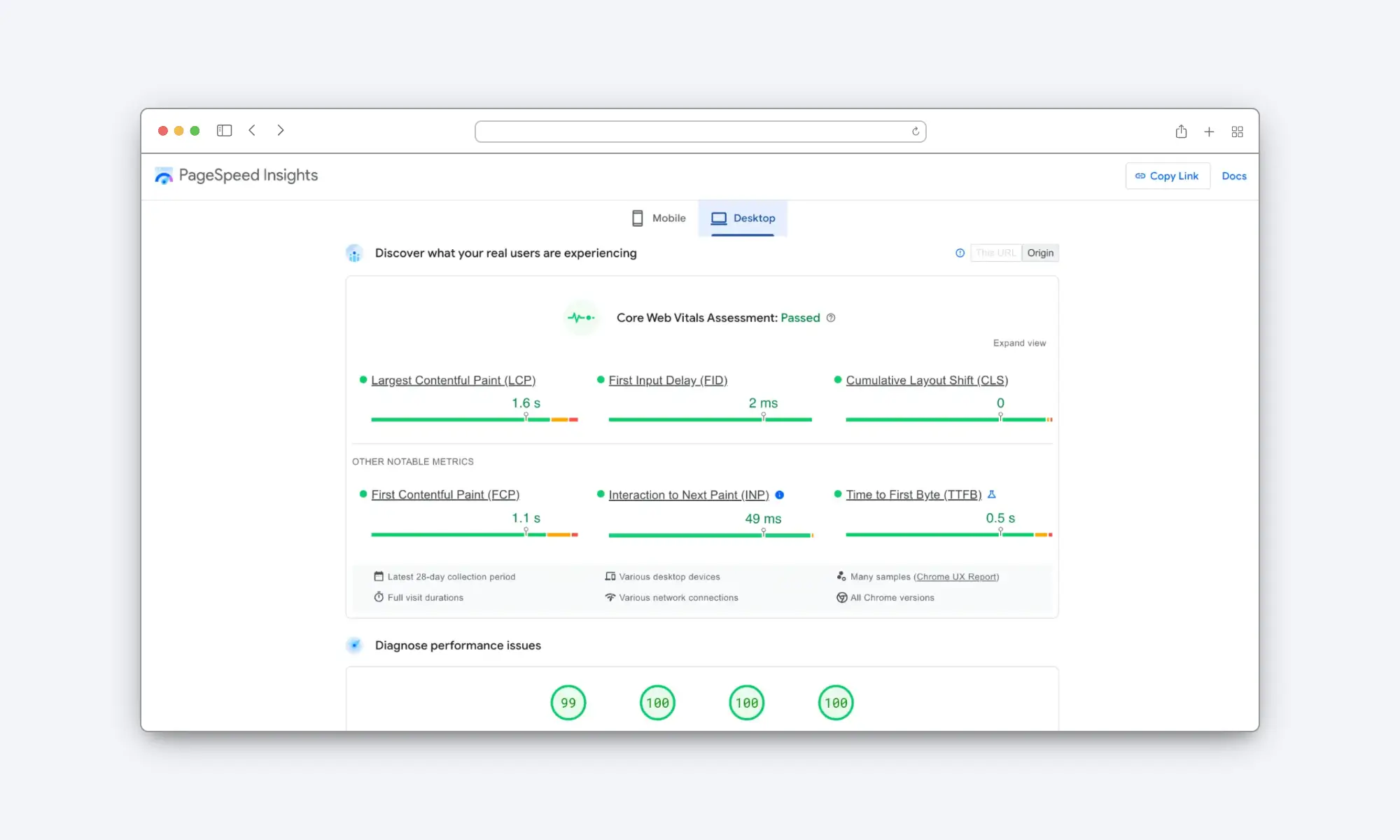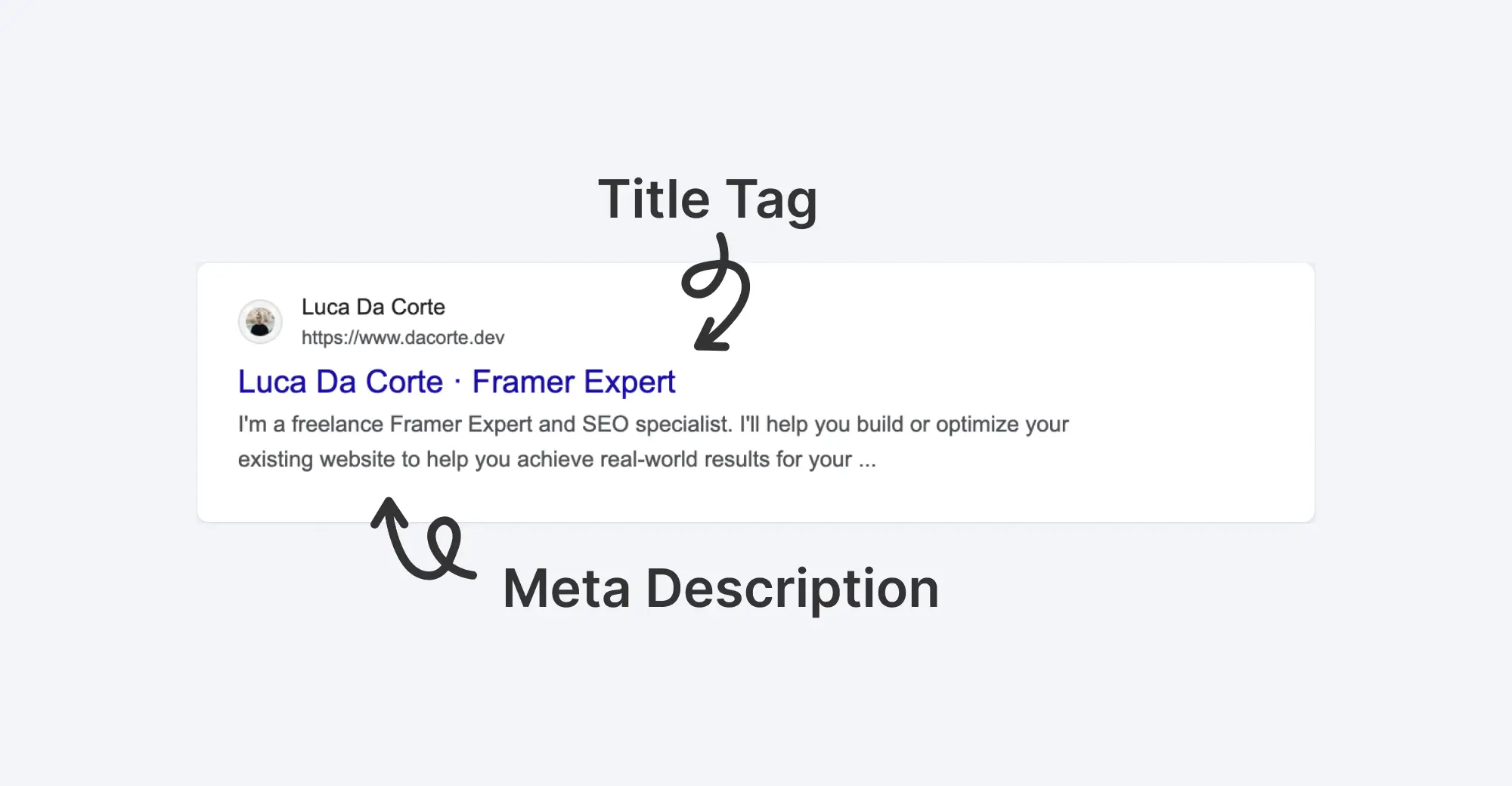Is Framer Good For SEO?
Introduction
Framer is the perfect choice if you want to build a stunning website in no time. But building a website is only half the battle. Getting traffic to it is the hard part!
In this article, I’ll answer the question everybody has: Is Framer good for SEO?
More specifically, this article will cover the following:
✅ Is Framer good for SEO?
✅ What actually drives Rankings
✅ Framer built-in SEO features
✅ What you can do to improve your SEO performance
Interested? Let’s get started!
Is Framer Good For SEO?
Let’s get straight to the point.
The quick answer is: Yes, Framer is good for SEO.
One thing that I love about Framer is that it simplifies fundamental SEO aspects, making it accessible even for non-technical users.
For example, it automatically generates an XML sitemap and a robot.txt file, making every website easily crawlable by search engines.
On top of that, it allows you to customise titles, descriptions, and URLs for each page, giving you complete control over search appearance.
However, there’s a harsh truth you need to hear: the website builder you choose has little to nothing to do with how well you rank on search results.
I know it’s a bold claim, but that’s the truth - and here’s why:
What Actually Drives Rankings
When you make a search, Google will return the results that it thinks are the most relevant and from the most reliable sources.
For example, when searching for “How to invest in cryptocurrency”, a guide from Investopedia is the first organic result. Why? Because it’s both relevant to what you searched for and from a trustworthy source.

As you can see, relevance and trustworthiness are the two MOST IMPORTANT SEO factors because they ensure users find what they’re looking for - which is what Google wants.
Now, let’s quickly look at how Google determines these two factors from a 30,000-foot view.
Determining relevance is relatively straightforward. Google analyses your page’s CONTENT to understand what it is about. Simple, right?
Determining trustworthiness is a bit trickier. To do that, Google looks at whether other important websites in your space link back to you.
For example, if you have a blog about finance and you get a BACKLINK from Business Insider, your website will be seen as much more reliable than a blog with zero incoming links.
So, what actually drives SEO ranking is:
Content (because it determines relevance)
Backlinks (because they determine trustworthiness)
If those two things are in place, I can guarantee you that you can rank even the crappiest website you’ve ever seen.
However, you still need to take care of some technical aspects (a.k.a. Technical SEO) if you want to maximise your SEO efforts - and here’s where Framer comes in.
Framer Built-in SEO Features
Let me ask you a question: Are you familiar with the concept of crawlability? Or what is an XML sitemap? What about a robots.txt file?
If you don’t, don’t worry! Because Framer will take care of all of it for you!
As mentioned above, Framer makes technical SEO easy for everyone - even for beginners. More specifically, here are the most important technical aspects it handles for you:
XML Sitemap
There’s a file called “sitemap” that every website should have to make it easier for search engines to crawl all the pages.
If you’ve never heard of this term, here’s what a basic sitemap looks like:

As you can see, it’s definitely not plain english. Usually, you’d have to use an online tool or a plugin to generate it for you, and you’d have to add it to your website structure.
But if you’re using Framer, you can forget about it! Framer will automatically generate one for you and make it available at this URL: https://www.domain/sitemap.xml
For example, you can find ours here: https://clicks.supply/sitemap.xml
Robots.txt File
Another critical file every website should have is a robots.txt file. This file helps search engine crawlers understand:
Where the sitemap is located.
What pages should get crawled.
Once again, Framer does it for you and makes it available at this URL: https://www.domain/robots.txt
For example, you can find ours here: https://clicks.supply/robots.txt
SSL Certificate Included
Have you ever opened a website and found a warning telling you the connection was not secure?
Something like this:

If that’s the case, it’s because the website did not have an SSL certificate. Having a secure connection (aka running your website on HTTPS) is no longer an option.
Your website must have an SSL certificate if you want to stand a chance of ranking.
However, unlike other platforms like WordPress, you don’t have to worry about it! Framer’s hosting infrastructure automatically generates (and updates) an SSL certificate for your custom domain - at no additional costs!
Fast Loading Website
Nobody likes a slow website. If your website is slow, it will worsen the user experience and get “penalised” by Google with lower rankings!
To deal with that, Framer employs several strategies, such as a Content Delivery Network (CDN), pre-rendering, load balancing, lazy loading, and so much more!
However, it can’t do everything for you. While Framer websites tend to be relatively fast, if you’re struggling with your core web vitals, you can check out this guide to speed optimisation in Framer.

What You Can Do To Improve Your SEO Performance
Framer can’t do everything for you. While it takes care of many technical aspects, there are some areas where you need to do some manual work.
More specifically, here’s what you can do to take care of the technical SEO aspects of your website:
Make Your Website Responsive
You probably already know this, but having a mobile-friendly website is essential for SEO for two main reasons:
Mobile-first Indexing
→ Google uses the mobile version of a site’s content for indexing and ranking. In other words, the mobile version of your website is what Google will look at when evaluating it.
Better User Experience
→ Obviously, if people can’t see the page’s content from their smartphone, that’s a bad user experience.
In other words, if your website is mobile-friendly, it will have an easier time ranking in search results.
However, having a mobile-friendly website is more than just fitting all the content within the screen.
Here are some other considerations to keep in mind:
Ensure the text is readable
Make clickable elements big enough
Don’t place clickable elements too close together
All these small details will have an impact on your user experience and your SEO rankings.
Different Metadata For Each Page
Every page on your website should have a different title tag and meta description. This allows search engines to understand what the page is about and also display the correct information on the search result pages.

In general, here are a couple of best practices to follow:
Keep your title tag below 60 characters.
Keep your meta description below 155 characters.
Match your H1 tag to your title tag.
Include your main keyword in the title tag.
If you don't know how to do that, I've written a guide on setting page titles and meta descriptions both for static and CMS-generated pages.
User-friendly URL
Framer allows you to choose the URL for the page.
In general, try to:
Make it readable for the user
Include the main keyword in it
That’s it.
Make Your Website Accessible
Having an accessible website means a better user experience for your visitors - which Google rewards.
Without getting into too much detail, here are some best practices you can follow:
Use alt text for your images.
→ Every non-decorative image on your website should have a concise and descriptive alternative text to display in case people can’t view the image.
Ensure enough contrast ratio.
→ Ensure a contrast ratio of at least 4.5:1 for normal text and 3:1 for large text. You can use this free online tool.
Use semantic HTML tags.
→ Use semantic HTML tags to make it easier for screen readers and search engine crawlers to understand your page.
Use Aria-labels when needed.
→ Use the aria-label attribute on elements that lack a clear name.
Add Structured Data
In some cases, using structured data (a.k.a. schema markup) might win you some additional real estate in the search engine result pages (SERPs).
In case you didn't know, structured data is a piece of code you add to your page's tag to help search engines better understand your content.
While it doesn't directly influence rankings, it can still help you in terms of SEO by making your website appear prettier in search results and increasing the CTR (click-through rate) as a consequence.
For reference, structured data can make your website go from this:

To this:

If you want to learn more about it or learn how to implement it, check out my guide on schema markup in Framer.
Conclusion
So, is Framer good for SEO? The answer is yes.
Framer makes it easy for everybody to handle all the technical SEO aspects you need to rank.
But remember that technical aspects are just a tiny component of SEO; what really drives ranking is:
Content
Backlinks
It’s as simple as that.
Framer won’t fail you. The SEO strategy you use will.
Thanks for reading!
- Luca




